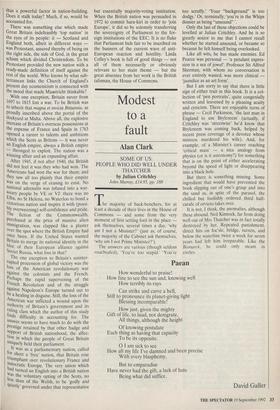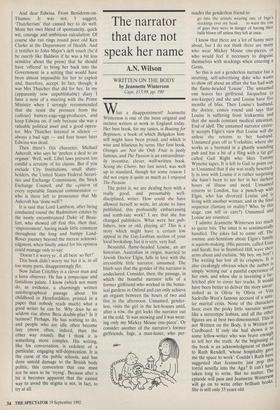Modest to a fault
Alan Clark
SOME OF US: PEOPLE WHO DID WELL UNDER THATCHER by Julian Critchley John Murray. £14.95, pp. 188 The majority of back-benchers, for at least a decade of their lives in the House of Commons — and some from the very moment of first setting foot in the place ask themselves, several times a day, 'why am I not a Minister?' (just as, of course, the majority of the Cabinet ask themselves, `why am I not Prime Minister?').
The answers are various (though seldom vouchsafed). 'You're too stupid.' You're too scruffy.' Your "background" is too dodgy.' Or, terminally, 'you're in the Whips dossier as being "unsound" '.
Only the last of these objections could be levelled at Julian Critchley. And he is so greatly senior to me that I cannot recall whether he started unsound, or became so because he felt himself being overlooked.
Like all wits, he has made enemies. Ed Pearce was personal — 'a petulant expres- sion in a sea of jowel'. Professor Sir Alfred Sherman, with whom no conversation is ever entirely wasted, was more clinical 'jaundice as an art form'.
But I am sorry to say that there is little sign of either trait in this book. It is a col- lection of 'pen portraits', quite congenially written and leavened by a pleasing acuity and cynicism. There are enjoyable turns of phrase — Cecil Parkinson, 'the last man in England to use Brylcreem' (actually, if Critchley was 'streetwise' he'd know that Brylcreem was coming back, helped by recent press coverage of a devotee whose mistress murdered his wife). And, for example, of a Minister's career reaching `critical mass' — a nice analogy from physics (or is it astronomy?) for something that is on the point of either accelerating beyond the speed of light or disappearing into a black hole.
But there is something missing. Some ingredient that would have prevented the book slipping out of one's grasp and into the sand as, in spite of the parasol, the chilled but foolishly ordered third half- carafe of orvieto takes over.
It is not, I think, the anomalies, although these abound. Neil Kinnock, far from doing well out of Mrs Thatcher was in fact totally destroyed by her. Repeated punishment, direct hits on foc'sle, bridge, turrets, and below the waterline twice a week for seven years had left him irreparable. Like the Bismarck, he could only steam in circles.
David Galler
Paean
How wonderful to praise! How fine to see the sun and, knowing well How terribly its rays Can strike and carve a hell, Still to pronounce its planet-giving light Blessing incomparable!
How just, given the mighty Gift of life, to laud, not denigrate, All things, although the height Of knowing postulate Each thing as having that capacity To be its opposite.
0 I am sick to see How all my life I've damned and been precise With every blasphemy, But to emparadise Have never had the gift, a lack of hate Being what did suffice. And dear Edwina. From Benidorm-on- Thames. It was not, I suggest, 'Thatcherism' that caused her to do well. More her own blend of spontaneity, quick wit, courage and ambitious calculation. Of course she ran rings round poor old Ken Clarke at the Department of Health. And it testifies to John Major's deft touch (he'd be exactly like Baldwin if he was a bit less sensitive about the press) that he should have 'offered' to bring her back into the Government in a setting that would have been almost impossible for her to exploit and, therefore, accept. In fact, though, it was Mrs Thatcher that did for her. In my (apparently now unpublishable) diary I have a note of a meeting with the Prime Minister when I strongly recommended that she resist the pressure from the (odious) battery-cage-egg-producers, and keep Edwina on, if only because she was a valuable political asset and a good opera- tor. Mrs Thatcher listened in silence always a bad sign — and four hours later Edwina was dead.
Then there's this character, Michael Ashcroft, who says he 'prefers a deal to an orgasm'. Well, well. Libel laws prevent too candid a scrutiny of his claims. But if you exclude City Institutions, small share- holders. the United States Federal Securi- ties and Exchange Commission, the Stock Exchange Council, and the opinion of every reputable financial commentator who is there left to pronounce that Mr Ashcroft has 'done well'?
It is said that Lord Lambton, after being conducted round the Badminton estates by the newly encumbranced Duke of Beau- fort, who showed off first this, then that, 'improvement', having made little comment throughout the long and bumpy Land- Rover journey beyond the merest acknowl- edgment, when finally asked for his opinion could manage only to say: 'Doesn't it worry ye', it all bein' so flet?' This book didn't worry me but it is, in all too many parts, disappointinglyflet.
Now Julian Critchley is a clever man and a keen observer. He has a sympadque and fastidious palate. I know (which not many do, as evidence, a charmingly written autobiographical passage about his childhood in Herefordshire, printed in a paper that nobody reads much) what a good writer he can be. Why does he so seldom rise above Beta double-plus? Is it laziness? Perhaps. He has nothing to do, and people who are idle often become lazy (more often, indeed, than the other way round). But I think it is something more complex. His writing, like his conversation, is redolent of a particular, engaging self-deprecation. It is the curse of the public schools, and has done untold damage to the British body politic, this convention that one must not be seen to be 'trying'. Because after a bit it becomes apparent that the easiest way to avoid the stigma is not, in fact, to try at all.



























































 Previous page
Previous page